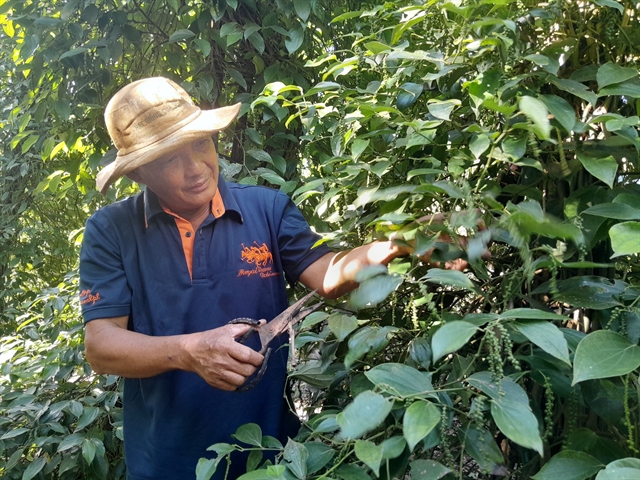 Society
Society


|
| Lê Văn Đen tends his newly planted pepper farm using organic methods in Đồng Nai Province’s Tân Tiến Commune. – VNA/VNS Photo K GỬIH |
ĐỒNG NAI — Đồng Nai Province is promoting organic and high-tech agriculture and seeks to create concentrated farming areas and grow high-quality produce.
The southeastern province encourages organisations and individuals engaged in producing, processing and trading agricultural, forestry and fisheries products to adopt organic methods.
This would help increase the value of products to 1.5–2 times that of their conventional counterparts besides ensuring safety for producers and protecting the environment and biodiversity.
It is also a timely step amid climate change and the rising demand for safe food.
Currently many localities are developing effective organic farming models that supply clean agricultural products to processing enterprises.
Nguyễn Văn Luận in Đắc Ơ Commune, a member of the Bình Phước Organic Agriculture Co-operative, shifted from traditional to organic pepper cultivation on a three-hectare farm eight years ago, and gained European certification.
He said his products fetch 25–40 per cent higher prices while production costs have fallen significantly.
“Growing organic pepper is not difficult. Many people mistakenly think chemical fertilisers and pesticides are essential to control pests and diseases, but that is wrong.
“We can produce organic fertilisers from indigenous microorganisms to apply to crops.”
The Bình Phước Organic Agriculture Co-operative has around 100 members. Of these, 29, with nearly 60ha of pepper, have obtained organic certification.
The others, with hundreds of hectares, maintain sustainable production under Rainforest Alliance standards, according to Mai Hiển Huy, the co-operative’s director.
Thanks to these practices, the co-operative is a partner of Nedspice Processing Vietnam Limited, he said, adding that the company buys products directly from the farms, paying a 20 per cent premium for organic pepper and 5 per cent for safe pepper.
Organic cashew farming has also proven lucrative.
The Trảng Cỏ Bù Lạch Organic Cashew Co-operative in Thọ Sơn Commune has more than 200 members, including over 120 ethnic minority households, cultivating 1,000ha of cashew under contract farming.
This has helped many households secure stable incomes.
Điểu Nu, a member, said: “Before joining the co-operative, cashew prices were unstable. After joining and farming organically, the price is VNĐ500–1,000 per kilogramme higher and stable.”
Thị Khưi, director of the co-operative, said organic and sustainable farming improves quality, ensures fair prices and stabilises markets.
“The co-operative has linked up with cashew exporters to support members with carrying on organic cultivation while guaranteeing product sales.
“This brings profits, improves livelihoods, and contributes to poverty alleviation.”
The province aims to zone and develop concentrated organic farming areas linked with production, processing and consumption value chains.
It also encourages the application of high-tech methods in deep processing, promoting products through fairs and exhibitions, building brands, geographical indications, and traceability systems.
Cooperation between enterprises and farmers has boosted yields by 20–30 per cent thanks to new seed varieties, while cutting pesticide costs and reducing climate risks.
After the merger of the former province of Bình Phước with it on July 1, Đồng Nai now has more than 338,000ha of agricultural land, including around 165,000ha of annual crops.
This extensive land area is a major advantage for developing concentrated farming zones, particularly for producing high-quality seeds.
In Đak Lua Commune, many households have switched from rice and maize to seed production, including bitter melon and angled luffa, earning hundreds of millions of đồng per hectare annually.
Đinh Văn Quang, a local farmer, said: “With enterprises supplying seeds and inputs such as fertilisers, providing technical guidance and guaranteeing product sales, farmers feel secure. It reduces production costs and market risks.”
Nguyễn Đình Thân, production director of Trang Viet Agricultural Development Company Limited in Xuân Đường Commune, said the company has partnered with farmers to grow a variety of seeds, including bitter melon, pumpkin, cucumber, wax gourd, and watermelon, for both the domestic and export markets.
The province supplies about 11,000 tonnes of seeds annually, meeting demand locally and beyond, according to its Department of Agriculture and Environment.
Nguyễn Văn Thắng, the department’s deputy director, said: “In agriculture, seeds determine productivity and quality. Therefore, the province strongly encourages enterprises to invest in research and the production of new seed varieties.
Đồng Nai has favourable land and soil conditions for seed production, especially the model of producing seeds through farmer–enterprise cooperation, which delivers high economic efficiency, he said.
The province also focuses on value chain production models, adopting drip irrigation, greenhouses, net houses, and smart nutrient management to meet VietGAP and GlobalGAP standards and expand exports.
It has various support policies such as tax breaks, land assistance and preferential credit for high-tech and organic agriculture projects.
It also strengthens the “four-party cooperation” model among farmers, scientists, businesses, and authorities to build sustainable value chains. — VNS




